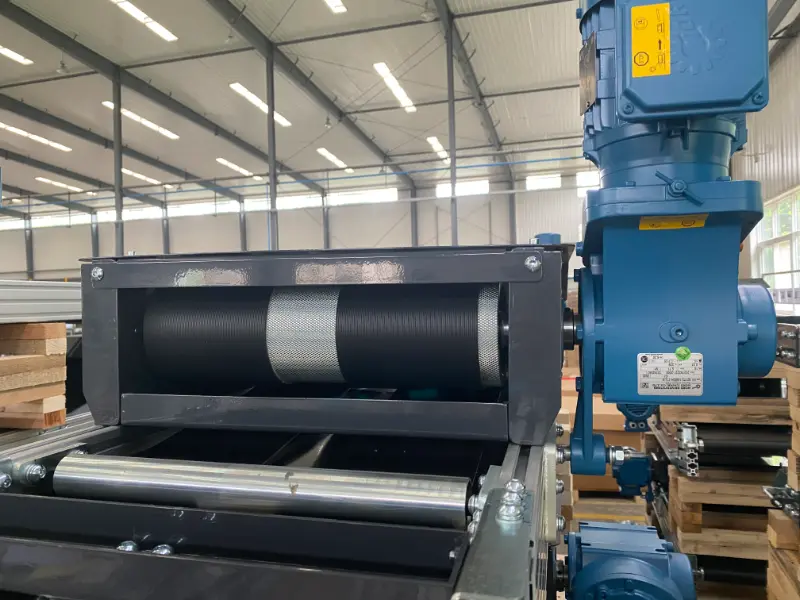Understanding Roller Conveyors and Their Applications
What Are Roller Conveyors?
Roller conveyors are essential components in material handling systems, consisting of a series of rollers supported within a frame. Objects can be moved along these rollers either manually, by gravity, or by powered mechanisms. This versatile system is widely used to transport various items, including boxes, crates, pallets, plastic totes, and trays, making it an integral part of warehouse and manufacturing operations.
Versatility of Roller Conveyors
Roller conveyors can be adapted and configured to work with a range of ancillary equipment, such as bends, gates, and turntables. They add flexibility to the type of transfers, diverters, and stops used within a conveyor system or automation setup. Available in materials like mild steel, galvanized steel, plastic, and stainless steel, roller conveyors can be tailored to meet specific operational needs and environmental conditions.
Historical Background of Roller Conveyors
The concept of roller conveyors dates back to 1908 when Hymie Goddard of Logan Company, Indiana, received the first patent for this innovative transport system. This invention introduced internal ball bearings, which facilitated the smooth movement of goods. However, it wasn’t until 1913, with Henry Ford’s introduction of the assembly line, that roller conveyors gained widespread popularity.
In the 1920s, roller conveyors evolved to transport heavier and larger goods over long distances. World War II further accelerated technological advancements, leading to the use of synthetic fabrics and polymers, which reduced maintenance costs. From the 1970s to the present, roller conveyors have seen continuous innovations, including the introduction of power conveyors and computer-controlled systems, enhancing efficiency and performance.
Industries Utilizing Roller Conveyors
Roller conveyors are indispensable in numerous industries due to their adaptability and efficiency. Key industries that rely on roller conveyor systems include:
Food Handling
Packaging
Logistics
Mail Delivery Services
Baggage Handling
Steelmaking
Manufacturing and Design
Benefits of Using Gravity Roller Conveyors
Gravity roller conveyors utilize the force of gravity to move items along the conveyor. By placing the conveyor on a decline angle, products can be transported without the need for a power source, offering significant cost and environmental benefits. Additionally, the lack of power requirements reduces maintenance costs, making gravity roller conveyors an economical and sustainable choice.
However, gravity roller conveyors may not be suitable in all scenarios. They can be challenging to control, potentially leading to damaged goods if the conveyor speed is too high, especially on steep declines with heavy items.
Advantages of Powered Roller Conveyors
Powered roller conveyors are ideal for transporting goods over long distances efficiently. These systems offer controlled speed, reducing the risk of damage to items and ensuring smooth, consistent movement. Powered roller conveyors are capable of handling heavier loads, making them a preferred choice in the manufacturing industry.
These systems can be divided into zones, allowing each zone to operate independently. This feature enhances efficiency and reduces operational costs, as only the zones with items will be active. Additionally, if a motor fails or a power issue occurs in one zone, the rest of the system can continue functioning, minimizing downtime.
Despite the higher initial cost, powered roller conveyors are a worthwhile investment for long-distance transport and heavy-duty applications. They automate processes, reduce the need for manual labor, and improve overall productivity.
Additional Insights on Roller Conveyors
1. Evolution of Roller Conveyors
Roller conveyors have evolved significantly since their inception, adapting to meet the changing demands of various industries.
2. Customizing Roller Conveyor Systems
Roller conveyor systems can be customized with additional features like incline conveyors, hydraulic tables, and lifts to enhance their functionality.
3. Future Trends in Roller Conveyor Technology
The future of roller conveyors lies in further automation and integration with advanced technologies, aiming to improve efficiency and reduce operational costs.
Conclusion
As a leading conveyor roller manufacturer, we understand the critical role that roller conveyors play in enhancing operational efficiency across various industries. Whether you need a gravity-based system for cost-effective transport or a powered solution for heavy-duty applications, our roller conveyors are designed to meet your specific needs. Contact us today to learn more about how our customized conveyor solutions can optimize your logistics and production processes.

